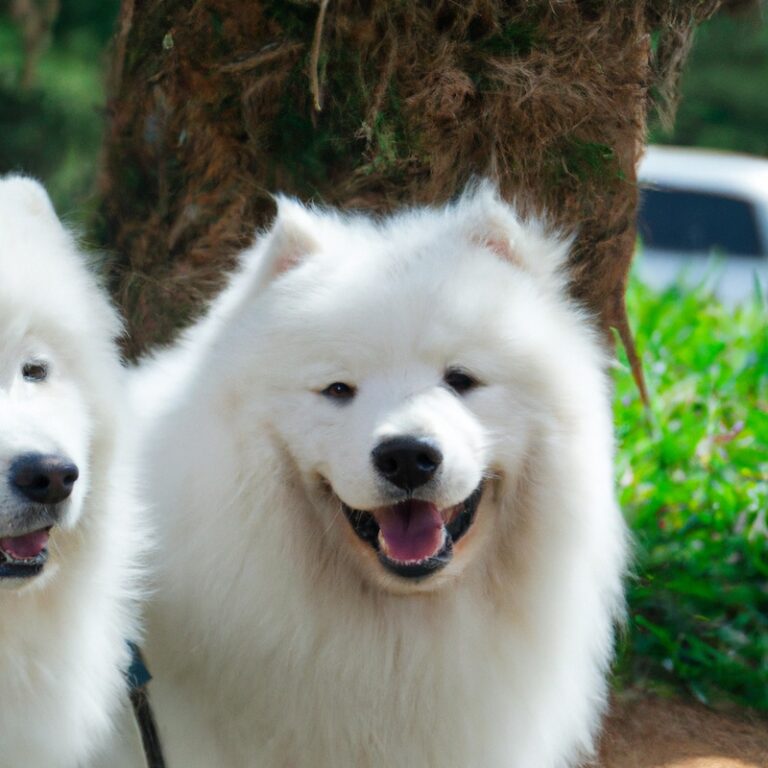How To Socialize a Samoyed With Other Pets?
Key Takeaways:
- Proper socialization is key for a Samoyed to get along well with other pets.
- Start socializing your Samoyed with other animals from a young age.
- Gradual introductions and positive reinforcement can help your Samoyed develop positive associations with other pets.
- Supervision and monitoring during interactions between your Samoyed and other pets is important to ensure safety and prevent any negative behaviors.
Are you a proud owner of a charming Samoyed, but struggling to socialize them with other pets? Well, fear not, because I’m here to share some valuable insights on how to make the process smoother and more enjoyable for both your Samoyed and their furry friends.
Understanding the unique temperament and characteristics of Samoyeds, known for their friendly and social nature, is essential for successful socialization.
In this article, I’ll guide you through the process of early socialization, introducing your Samoyed to other pets, and employing positive reinforcement techniques. Get ready to create harmonious relationships between your Samoyed and their four-legged companions!
| Pet to Socialize | Steps to Socialize |
|---|---|
| Dogs | 1. Introduce them gradually, on neutral territory 2. Monitor their interactions closely 3. Reward positive behavior 4. Provide regular supervised playdates 5. Enroll in obedience training classes |
| Cats | 1. Keep them separated initially 2. Utilize a safe and gradual introduction process 3. Use positive reinforcement and treats for calm behavior 4. Provide separate spaces for both pets to retreat 5. Monitor their interactions and intervene if necessary |
| Small Pets (e.g., rabbits, guinea pigs) | 1. Create a safe and secure environment for both pets 2. Allow visual and olfactory interaction through barriers 3. Gradually introduce supervised physical interaction 4. Maintain separate enclosures when unsupervised |
Understanding the Samoyed breed
Temperament and characteristics of a Samoyed
Samoyeds are known for their friendly and gentle nature. They are sociable and make great family pets.
This breed is generally good with kids and other animals.
Samoyeds love to be around people and crave attention. They are intelligent and easy to train.
However, they can also be independent and stubborn at times.
Samoyeds have a high energy level and require regular exercise to keep them happy and healthy. They have a thick, double coat that requires regular grooming to keep it in good condition.
Overall, Samoyeds are loving, loyal, and make wonderful companions.
Samoyeds as a social breed
Samoyeds are known for their friendly and sociable nature.
They thrive on human interaction and enjoy the company of other pets.
Their friendly demeanor makes them great companions for families with other animals.
Samoyeds are generally good with other dogs, cats, and even smaller pets like rabbits or guinea pigs.
However, it is important to introduce them properly and supervise their interactions to ensure everyone’s safety.
Gradual introductions, positive reinforcement, and providing plenty of exercise and mental stimulation can help ensure a harmonious relationship between your Samoyed and other pets in the household.
Guidelines for socializing a Samoyed
Early socialization and training
Early socialization and training are vital for a Samoyed. Introduce your pup to various people, animals, and environments in a positive way.
This helps them develop into well-rounded and confident dogs.
Start socializing from a young age and expose them to different situations regularly. Use positive reinforcement techniques to teach basic obedience commands such as sit, stay, and come.
Consistency and patience are key.
Seek professional help if needed to ensure your Samoyed receives the best socialization and training.
Introducing a Samoyed to other pets
Introducing a Samoyed to other pets can be a smooth process with proper guidance.
Start by ensuring a controlled environment for the initial meeting.
Allow both pets to sniff each other from a safe distance and gradually decrease this distance.
Supervise the interaction closely and reward positive behavior.
Gradually increase the time spent together and provide separate areas for each pet if needed.
Patience and consistency are key in creating a harmonious relationship between your Samoyed and other pets.
Positive reinforcement techniques
Positive reinforcement techniques are highly effective when it comes to socializing a Samoyed with other pets.
Here are some techniques you can use:
- Reward-based training: Reward your Samoyed with treats, praise, or playtime when they exhibit positive behaviors around other pets.
- Gradual introductions: Start by introducing your Samoyed to calm and well-behaved pets in controlled environments. Gradually increase the exposure to different pets over time.
- Consistency: Be consistent in your training and interactions with your Samoyed. This will help reinforce positive behaviors and build trust.
- Patience: Give your Samoyed time to adjust and feel comfortable around other pets. Rushing the process can lead to anxiety and stress.
- Supervision: Always supervise interactions between your Samoyed and other pets to ensure everyone’s safety. Step in if any signs of aggression or discomfort are observed.
By using these positive reinforcement techniques, you can help your Samoyed develop positive associations with other pets and build strong social skills.

Tips for successful socialization
Gradual introductions and supervised interactions
When introducing your Samoyed to other pets, it’s important to take it slowly and supervise their interactions. Gradual introductions allow the animals to become familiar with each other’s scents and presence.
Start by allowing them to see each other through a gate or a barrier.
Then, you can progress to controlled, on-leash meetings in a neutral territory. Keep the interactions short and positive, rewarding calm behavior.
Always be present to intervene if necessary and ensure the safety of all animals involved.

Providing a safe and neutral environment
When socializing your Samoyed with other pets, it’s important to provide a safe and neutral environment.
Here’s how you can do it:
- Introduce them in a neutral space: Choose a location where none of the pets have established territorial boundaries or dominance. This can help prevent unnecessary conflict.
- Supervise the interactions: Always keep a close eye on how your Samoyed interacts with other pets. This allows you to intervene and redirect any inappropriate behavior or aggression.
- Gradually increase the exposure: Start with short and controlled interactions, and gradually increase the length and frequency of their time together. This helps both pets adjust and get comfortable with each other’s presence.
- Offer positive reinforcement: Reward your Samoyed and the other pet for calm and friendly behavior during their interactions. This encourages positive associations and can help build a strong bond between them.
By providing a safe and neutral environment, you set the foundation for successful socialization between your Samoyed and other pets.

Monitoring body language and behavior
When socializing your Samoyed with other pets, it’s important to pay close attention to their body language and behavior.
This will help you gauge their comfort level and ensure a positive interaction.
Look for signs of relaxation, such as loose body posture and wagging tail.
Conversely, be alert to any signs of stress or fear, such as raised hair, stiff body, or growling.
If you notice any concerning behavior, calmly separate the animals and try again later.
Being proactive in monitoring body language and behavior can help create a harmonious environment for your Samoyed and other pets.
Common challenges in socializing a Samoyed
Aggression and anxiety issues
Aggression and anxiety can be common issues when socializing a Samoyed with other pets. It’s important to address these issues early on to create a harmonious environment.
One way to tackle aggression is through positive reinforcement training, rewarding good behavior and redirecting negative behavior.
To address anxiety, it’s recommended to gradually introduce the Samoyed to new situations, people, and animals, using treats and praise to help them feel more comfortable. Seeking professional help if needed can also make a big difference in resolving these issues.
Resource guarding tendencies
Resource guarding tendencies can be a challenge when socializing a Samoyed with other pets.
Samoyeds have a natural instinct to protect their belongings, including food, toys, and even their favorite spots.
It’s important to address this behavior early on by using positive reinforcement training and implementing a consistent routine.
Gradually introduce your Samoyed to other pets, always supervising interactions and providing separate resources to avoid conflict.
Consulting with a professional dog trainer can also be beneficial in managing and modifying resource guarding tendencies in your Samoyed.
Separation anxiety and socialization difficulties
Separation anxiety and socialization difficulties can be common challenges when it comes to Samoyeds. These friendly and sociable dogs can become anxious when left alone for long periods of time, leading to destructive behavior.
To combat separation anxiety, gradually increase the time you spend away from your Samoyed and provide them with interactive toys or puzzles to keep them occupied.
Socializing a Samoyed with other pets may also be challenging, as they can have a strong prey drive. Gradual introductions, supervised interactions, and positive reinforcement training can help in successfully socializing them with other animals.
Frequently Asked Questions (FAQs)
Can an adult Samoyed be socialized with other pets?
Yes, an adult Samoyed can be socialized with other pets.
It may take time and patience, as each dog is unique.
Start by introducing them slowly in a neutral environment and supervise their interactions.
Ensure positive experiences by rewarding good behavior.
Gradually increase the time spent together and provide ample opportunities for positive interactions.
Consistency and positive reinforcement are key to successful socialization.
Remember, every dog is different, so take it at their own pace and always prioritize their safety.
Are Samoyeds good with cats/small animals?
Samoyeds are generally friendly and gentle dogs, which makes them good with cats and small animals if properly socialized from an early age.
It’s important to introduce them slowly and supervise their interactions.
Some Samoyeds may have a higher prey drive, so it’s crucial to provide proper training and ensure that the cat or small animal feels safe.
Proper socialization and positive reinforcement can help establish a harmonious relationship between your Samoyed and other pets.
How long does socializing a Samoyed take?
Socializing a Samoyed can take anywhere from a few weeks to several months. It really depends on the individual dog and their previous experiences.
Some Samoyeds may adjust well to new pets right away, while others may need more time to feel comfortable.
Consistency and patience are key. Gradually introduce your Samoyed to other pets, allowing them to interact in a controlled and positive environment.
Remember to reward good behavior and never force interactions.
Take it day by day, and eventually, your Samoyed will become more confident and social with other pets.
Final Verdict
Socializing a Samoyed with other pets is both important and achievable. Understanding the temperament and characteristics of the breed is crucial in providing the right environment for successful socialization.
Early socialization and positive reinforcement techniques are key in building a strong foundation.
Gradual introductions, a safe and neutral environment, and careful monitoring of body language and behavior can help overcome common challenges. While some Samoyeds may have aggression or anxiety issues, with patience and consistency, these can be overcome.
Successful socialization takes time, but the rewards of a well-socialized Samoyed are worth it.







